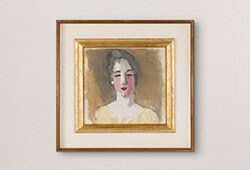Jesper Just
"The Lonely Villa (2004)"
Utförd 2004. DVD och DVCAM pal. 5:30 min. Upplaga 9/10 +2AP.
Proveniens
Christina Wilson Gallery, Köpenhamn.
Utställningar
Emma Museum, Espoo, "Jesper Just: The Lonely Villa", 1 februari - 28 maj 2023, ett annat exemplar utställt.
MAC/VAL, Paris, "Jesper Just", 22 oktober 2011 - 5 februari 2012, ett annat exemplar utställt.
Brooklyn Museum, New York, "Jesper Just: Romantic Delusions", 19 september 2008 - 4 januari 2009, ett annat exemplar utställt.
Australian Centre for Contemporary Art, Melbourne, "Intimacy", 7 oktober - 30 november 2008, ett annat exemplar utställt.
Witte de With, Center for Contemporary Art, Rotterdam, 'Jesper Just', 3 mars - 6 maj 2007, ett annat exemplar utställt.
Stedelijk Museum Amsterdam, "Jesper Just - Something to love", 9 december 2006 - 20 januari 2007, ett annat exemplar utställt.
Moderna Museet, Stockholm, "Something to love", 1 januari - 22 februari 2006, ett annat exemplar utställt.
Perry Rubenstein Gallery, New York, "Jesper Just". 3 november - 22 december 2004, ett annat exemplar utställt.
Övrig information
The Danish gallery Nicolai Wallner describes the film on their website:
'In “The Lonely Villa” we see several distinguished looking older men in dimly lit surroundings, each seated in silence at his own table waiting for the telephone before him to ring. Once the protagonist’s phone finally rings, the face of a young man at the other end appears, singing a love song in a soft, clear voice. The older man responds with a new song, and gradually his waiting companions all join in, like the chorus of a classic Greek play. The tenderness of the men contrasts with their appearance and the situation, initially giving the scene an absurd, comical aspect. In the end, however, its poignancy predominates: these men are not ashamed to show their feelings, even in public, even in the presence of other men.'





















































